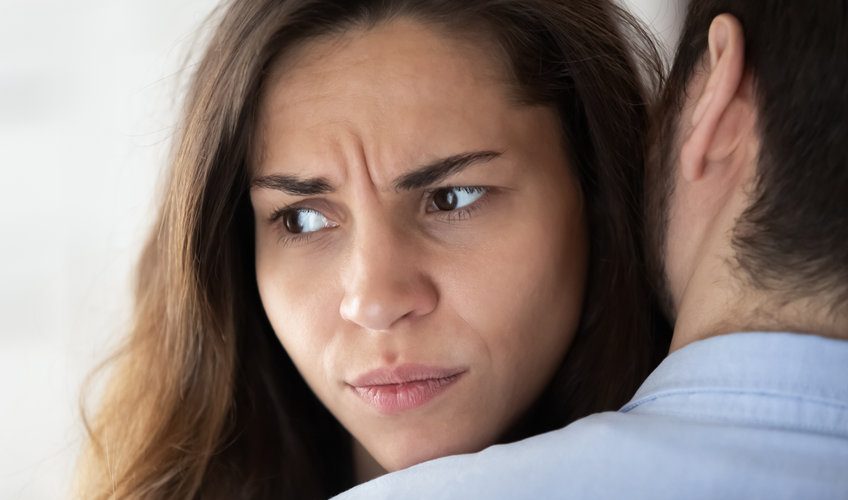When we begin a new relationship, it can sometimes cause us to feel a little nervous or even anxious, and this is completely normal. There is some risk associated with relating to someone we’re attracted to and hoping to build a relationship with. There’s the risk we will love them more than they love us, the risk that they will reject or abandon us or that we’ll find out they weren’t who we thought they were. We can also experience the thought that ‘something is sure to go wrong’ or ‘it will all come crashing down’. But if we are resilient, the risk will be worth it, and the anxiety will fade over time.
Relationship anxiety isn’t as logical as it seems. We can experience it even if the person getting to know us better is genuinely lovely and respectful, and things seem to go from strength to strength.
So, what are the symptoms of relationship anxiety?
Relationship anxiety can look like classic anxiety symptoms, such as feeling in a panic and experiencing increasingly illogical thoughts. It may also include changes to your sleep and appetite, a racing heart, sweatiness, muscle tension, panic attacks, and a lowered immune system.
Relationship anxiety can also look like:
- emotional instability
- excessive people-pleasing
- looking for problems
- being unfocused or foggy
- obsessing about the relationship
- overthinking and overanalysing every detail of every conversation or behaviour.
- fearing abandonment
- constant indecision
- push-pulling (alternating patterns of drawing a partner close and then pushing them away)
So why can entering into a new relationship cause us anxiety?
Even if we put ourselves out there seeking love, our unconscious mind might feel very differently. Our unconscious mind holds our core beliefs. Sometimes, our core beliefs may be ‘limiting’. These are called ‘limiting beliefs’,which arebeliefs we have mistaken forfact. We tend to then compare every decision we make to the limiting belief. These limiting beliefs generally develop in our childhood.
If you experienced some difficult periods in your childhood, e.g.,a parent who was absent or who wasn’t available to love you and give you the attention you needed, you may have developed beliefs such as, “I am not worthy” or “love is dangerous”.
When you reach adulthood, and someone tries to get close to you, your brain may trigger anxiety, causing you to back away and avoid getting too close. Anxiety is your brain’s way of trying to let you know there is danger, and that you need to stay alert.
How Attachment Styles Influence Our Relationships
Another way of looking at relationship anxiety is to become familiar with attachment styles. Attachment theory suggests that all children need at least one stable caregiver who gives them consistent love and attention and keeps them safe. If a parent only loves us when we are ‘good’, or if they neglect our basic needs or behave in abusive or irresponsible ways, children can develop what is called an ‘insecure attachment style’ that they then take into adulthood. Here is a link to a recent study ‘Adult attachment, stress, and romantic relationships’ that gives a more in-depth view on attachment and relationship relationship anxiey. https://www.sciencedirect.com/science/article/abs/pii/S2352250X16300306?undefined&utm_medium=organic&utm_source=blog&utm_campaign=anxiety-in-relationships
Anxious attachment
Having an anxious attachment style means that although we long for love and closeness, we tend to become insecure, try too hard to please, and ultimately end up very stressed out by our relationship and unable to relax. For example, if the other person doesn’t text for a few hours, you might become very anxious and send several texts, and even accuse them of wrongdoing only for them to explain later their train was delayed and their phone battery died.
What can help to reduce relationship anxiety?
When looking to reduce your relationship anxiety, it’s helpful to identify what’s driving it. You don’t have relationship anxiety for no reason. Any number of factors, including fear, low self-esteem, lack of confidence, and shame, can make you feel anxious.
Here are some suggestions:
- Separate your feelings from your thoughts. Having negative thoughts can be common when you are experiencing relationship anxiety. Challenge your negative thoughts by challenging them with evidence and logic, and when you find yourself having negative thoughts, focus on your strengths and positive qualities.
- Let your partner know what you’re experiencing: Good communication enhances and deepens relationships whereas a lack of communication can damage them.
- Be an Active Listener: Listen to your partner and ask them questions that clarify their perspective. This can help you to avoid jumping to conclusions, which can fuel relationship anxiety.
- Use Mindfulness and Self-Soothing when feeling anxious: Often, anxiety produces physical symptoms in our bodies, including increased heart rate, tightness in the chest or a feeling of light-headedness. Mindfulness can help to reduce symptoms of anxiety as can self-soothing exercises that focus on one or more of your five senses. https://sydneyhillscounselling.com.au/blog/mindfulness-for-mental-health-and-wellbeing/
- Avoid Unhealthy behaviours: Relationship anxiety often leads to unhealthy relationship behaviours, including excessively seeking reassurance, clinging to your partner, texting them too often, becoming demanding of their time and attention, and jealousy.
- Deal with conflict in a healthy way: Not addressing relationship conflict can lead to resentment and the breakdown of a relationship. Take responsibility for your part in the conflict and focus on using ‘I’ statements.
- Focus on You: Practising self-care can help reduce relationship anxiety. Regular exercise, eating healthy meals and snacks, and developing good sleep habits go a long way towards reducing anxiety. Cultivating your own interests and hobbies and maintaining your own friendships will contribute greatly towards developing more confidence and a sense of greater self-worth.
Can seeing a counsellor help me with relationship anxiety?
Seeing a counsellor is highly recommended if you’re experiencing relationship anxiety. Relationship anxiety tends to be based oncomplex issues that are unlikely to go away if we just ignore them. This is particularly true if you have experienced any childhood trauma or sexual abuse. By attending counselling, it’s not only your romantic relationships that will improve but all your relationships, including those with your family and colleagues.
If it’s time for you to learn how to love without relationship anxiety, contact Sydney Hills Counselling. We will provide you with insight, tools, and strategies to help you heal any attachment issues and move you towards developing healthier romantic relationships. Call us today on (02) 9159 6277 to make an appointment, or email us at [email protected]. We always return phone calls and reply to emails within 48 hours.
Copyright © 2024 by Sydney Hills Counselling






